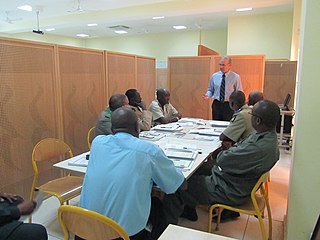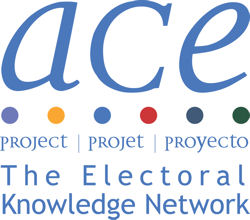
The International Republican Institute (IRI) is an American nonprofit organization founded in 1983 and funded and supported by the United States federal government. Most of its board is drawn from the Republican Party. Its public mission is to advance freedom and democracy worldwide by helping political parties to become more issue-based and responsive, assisting citizens to participate in government planning, and working to increase the role of marginalized groups in the political process, including women and youth. It has been repeatedly accused of foreign interference and has been implicated in the 2004 Haitian coup d'état. It was initially known as the National Republican Institute for International Affairs.

Election monitoring involves the observation of an election by one or more independent parties, typically from another country or from a non-governmental organization (NGO). The monitoring parties aim primarily to assess the conduct of an election process on the basis of national legislation and of international election standards. There are national and international election observers. Monitors do not directly prevent electoral fraud, but rather record and report instances of suspicious practices. Election observation increasingly looks at the entire electoral process over a long period of time, rather than at election-day proceedings only. The legitimacy of an election can be affected by the criticism of monitors, unless they are themselves seen as biased. A notable individual is often appointed honorary leader of a monitoring organization in an effort to enhance legitimacy of the monitoring process.

The National Democratic Institute (NDI) is a non-profit American non-governmental organization whose stated mission is to "support and strengthen democratic institutions worldwide through citizen participation, openness and accountability". It is funded primarily by the United States and other Western governments, by major corporations and by nonprofits like the Open Society Foundations.

The International Institute for Democracy and Electoral Assistance is an intergovernmental organization that works to support and strengthen democratic institutions and processes around the world, to develop sustainable, effective and legitimate democracies. It has regional offices in Europe, Latin America and the Caribbean, Asia and the Pacific, Africa and West Asia, and North America. The organization is headquartered in Stockholm, Sweden.

Democracy promotion, also referred to as democracy building, can be domestic policy to increase the quality of already existing democracy or a strand of foreign policy adopted by governments and international organizations that seek to support the spread of democracy as a system of government. Among the reasons for supporting democracy include the belief that countries with a democratic system of governance are less likely to go to war, are likely to be economically better off and socially more harmonious. In democracy building, the process includes the building and strengthening of democracy, in particular the consolidation of democratic institutions, including courts of law, police forces, and constitutions. Some critics have argued that the United States has used democracy promotion to justify military intervention abroad.

Ziyad Baroud is a French Lebanese civil servant and civil society activist. He served as minister of interior and municipalities, considered to be one of the most powerful positions in the country, from 2008 to 2011 for two consecutive cabinets in both Fuad Siniora and Saad Hariri's governments.

The Office of Transition Initiatives (OTI) is part of the United States Agency for International Development (USAID) Bureau for Democracy, Conflict, and Humanitarian Assistance (DCHA) and was developed to provide fast, flexible, short-term assistance to take advantage of windows of opportunity to build democracy and peace. It seeks to lay the foundations for long-term development by promoting reconciliation, jump starting economies and helping stable democracy take hold.
Electoral boundary delimitation is the drawing of boundaries of electoral precincts and related divisions involved in elections, such as states, counties or other municipalities. It can also be called "redistribution" and is used to prevent unbalance of population across districts. In the United States, it is called redistricting. Unbalanced or discriminatory delimitation is called "gerrymandering." Though there are no internationally agreed processes that guarantee fair delimitation, several organizations, such as the Commonwealth Secretariat, the European Union and the International Foundation for Electoral Systems (IFES) have proposed guidelines for effective delimitation.
The Electoral Institute for Sustainable Democracy in Africa, or EISA, is an organization founded in 1996 in Johannesburg to "promote credible elections, participatory democracy, human rights culture and the strengthening of governance institutions for the consolidation of democracy in Africa."
The Association of European Election Officials or ACEEEO was an organization of election management bodies founded in 1991 to promote the institutionalization and professionalization of democratic procedures in Europe. The organization held annual conferences to discuss theoretical and practical issues important to its members. It dissolved on 11 March 2022 in response to the 2022 Russian invasion of Ukraine.

Timor Leste, since its creation in 1999, has received aid from many different parts of the International Community to help stabilise this new country. Despite this international support, East Timor still has stability issues.
The International Foundation for Electoral Systems (IFES) operates a number of election support missions in Asia. Following their elections plus approach, IFES has participated in a diverse number of programs, both enhancing the governmental organizations that directly enhance elections and enhancing civil society through the endorsement of non-governmental organizations.
William "Bill" Sweeney, Jr. OBE is a businessman and politician who was the president and chief executive officer of the International Foundation for Electoral Systems (IFES) from 2009 to 2018. He currently serves as an executive-in-residence at the American University School of Public Affairs.

The ACE Electoral Knowledge Network is a web portal with information on elections designed to meet the needs of people working in the electoral field.

Democracy promotion by the United States aims to encourage governmental and non-governmental actors to pursue political reforms that will lead ultimately to democratic governance.
The Global Electoral Organization Conference is an invitation-only conference which aims to "bring together electoral practitioners and experts to exchange knowledge and share experiences, to provide a forum for networking, to present opportunities for provoking debate and promoting initiatives."

Parliamentary elections were held in Burkina Faso on 2 December 2012. They were the first elections held since the National Assembly dissolved the National Electoral Commission in 2011, following fraud allegations concerning the 2010 presidential elections. Municipal elections for over 18,000 councillors were held simultaneously. The elections were held amidst a period of political uncertainty, following protests against President Blaise Compaore's regime.
The Institute for Democratic Alternatives in South Africa (IDASA) later known as the Institute for Democracy in South Africa was a South African-based think-tank organisation that was formed in 1986 by Frederik van Zyl Slabbert and Alex Boraine. Its initial focus from 1987 was creating an environment for white South Africans to talk to the banned liberation movement in-exile, the African National Congress (ANC) prior to its unbanning in 1990 by the President F. W. de Klerk. After the South African election in 1994, its focus was on ensuing the establishment of democratic institutions in the country, political transparency and good governance. Caught up in a funding crisis after the 2008 global financial crisis, closed in 2013.

The European Centre for Electoral Support (ECES) is a not-for-profit, private, non-partisan and independent foundation with its headquarters in the capital of Belgium, Brussels.
Eric Bjornlund is an American expert in democratization assistance and election observation and co-founder and president of Democracy International and the author of Beyond Free and Fair: Monitoring Elections and Building Democracy. Bjornlund is also a lawyer and adjunct professor at Georgetown University.











